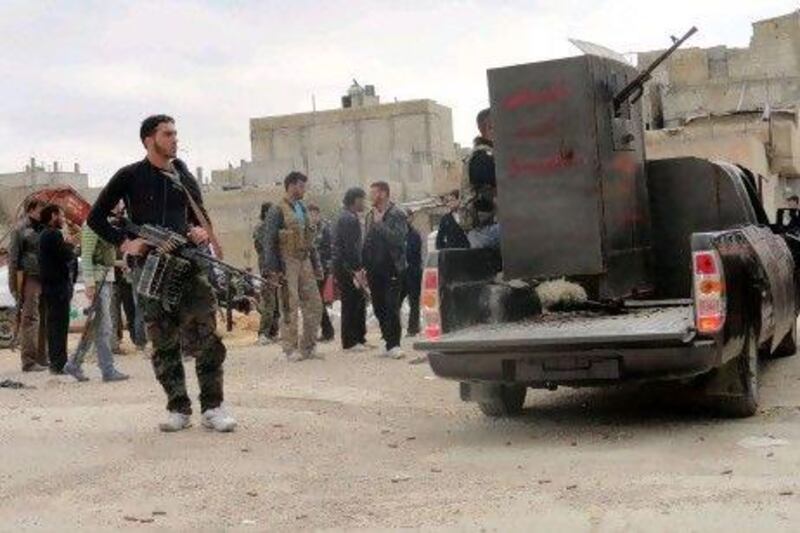The international community was urged yesterday to act quickly in Syria to prevent the "potential massacre of tens of thousands of children, women and elderly people".
As rebels fighting to overthrow the government retreated from a besieged district of Homs the 4th Armoured Division commanded by the president's younger brother, Maher Al Assad prepared to move in.
The decision for a "tactical" withdrawal from the Baba Amr district was made to spare the 4,000 civilians who have remained in their homes in the neighbourhood, said the rebel Free Syrian Army, which is fighting to overthrow the president, Bashar Al Assad.
And the Syrian National Council (SNC) urged "the international community, Muslim and Arab states to intervene immediately to prevent a potential massacre in the coming hours against tens of thousands of children, women and elderly people".
In another significant development yesterday, Russia and China, who have vetoed two resolutions condemning the Syrian government's bloody crackdown and calling for Mr Al Assad to step down, signed a UN Security Council statement.
The statement deplored the "rapidly deteriorating humanitarian situation and called on Syria to grant UN humanitarian chief Valerie Amos "unhindered access".
The exile alliance of several opposition groups had earlier called on the international community "to pressure the criminal regime" to allow the International Committee of the Red Cross "to enter and evacuate casualties and provide immediate humanitarian corridors to bring in medical and food supplies".
The International Committee of the Red Cross and Syrian Arab Red Crescent and International Committee of the Red Cross said last night that it had received permission from Syrian authorities to enter Baba Amr.
At least 17 civilians were killed yesterday in the battle for Baba Amr, according to activists and the main United Nations human-rights body condemned "the widespread and systematic violations of human rights and fundamental freedoms by the Syrian authorities".
Members of the UN Human Rights Council voted 37 in favour of the condemnation with three countries - Russia, China and Cuba - opposing it.
The resolution "sends a forceful message about the international community's outrage", said Eileen Chamberlain Donahoe, the United States' representative to the council.
"The three countries that chose to vote 'no' at the human-rights council today find themselves isolated from the strong international consensus on the need to protect the people of Syria."
Despite voting against the resolution, Russia strongly urged Syria to allow the UN humanitarian chief, Valerie Amos, into the country to assess the situation in cities such as Homs.
The deputy foreign minister of Russia, Gennady Gatilov, told Itar-Tass in Geneva that Russia expected "the Syrian government ... in the coming days to give a positive response to the arrival of UN humanitarian coordinator Valerie Amos".
Also yesterday it was announced that the Gulf Cooperation Council foreign ministers would meet their Russian counterpart, Sergei Lavrov, in Riyadh on Wednesday to discuss developments in Syria. Kuwait's foreign minister, Sheikh Sabah Khaled Al Sabah, said the ministers from the six-nation bloc - Bahrain, Oman, Kuwait, Qatar, Saudi Arabia and the United Arab Emirates - will "express their disappointment with the Russian stance," on the crisis in Syria.
Moscow along with Beijing has twice wielded its Security Council veto to block UN action on the crisis in Syria, first in October last year and again in February.
Sheikh Sabah said that Gulf nations will "call on Russia to take a position that will meet the aspirations of the Syrian people".
The Kuwait parliament called for arms to be sent to Syrian rebels, adding to pressure in some Arab states for action to help topple Mr Al Assad's regime.
The legislature, which like those in other Gulf monarchies has few powers, voted overwhelmingly to recommend the government help arm the Free Syrian Army.
Three days earlier Qatar's prime minister said he was in favour of delivering arms to the Syrian opposition. "We should do whatever necessary to help them, including giving them weapons to defend themselves," Sheikh Hamad bin Jassim Al Thani said.
Syria's main opposition group formed a military council yesterday to unify all armed resistance to Mr Al Assad's regime as the conflict veered closer to civil war.
The Paris-based leadership of the Syrian National Council (SNC) said its plan was coordinated with the most potent armed opposition force - the Free Syrian Army - made up mainly of army defectors.
"The revolution started peacefully and kept up its peaceful nature for months, but the reality today is different and the SNC must shoulder its responsibilities in the face of this new reality," the SNC president,
Burhan Ghalioun, said in Paris, adding that any weapons flowing into the country should go through the council.
However, he said: "We want to control the use of weapons so that there won't be a civil war," he said. "Our aim is to help avoid civil war."
The US ambassador to Syria, Robert Ford, told the US senate foreign relations committee that the "security forces have maintained their cohesion, but they are under significantly more stress in the first quarter of 2012 than they were even three or four months ago".
The UN estimates that more than 7,500 people have been killed since the uprising started in March 2011. Activists put the death toll at more than 8,000, most of them civilians.
* With additional reporting by the Associated Press, Reuters and Agence France-Presse





